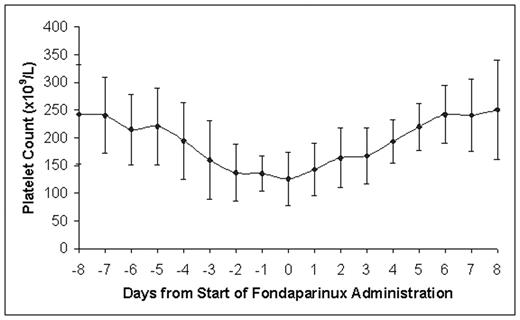Abstract
The development of new non-heparin anticoagulant therapies has increased interest in the treatment of type II heparin-induced thrombocytopenia (HIT). Standard therapy involves administration of an intravenous direct thrombin inhibitor (DTI), either argatroban or lepirudin. Due to a lack of cross-reactivity to HIT antibodies in vitro, the synthetic pentasaccharide fondaparinux sodium is an appealing alternative, but its use in this disorder has not been comprehensively examined. Here, we report our experience with fondaparinux in HIT and an analysis of safety and efficacy in this setting. We reviewed all in-patient cases of HIT at the Massachusetts General Hospital that were confirmed by the heparin-platelet factor 4 antibody test and were treated with fondaparinux. Twenty patients satisfied diagnostic criteria for HIT. Each patient studied lacked another competing, compelling etiology for thrombocytopenia and was treated with fondaparinux for more than five days within one month of diagnosis. The average duration of therapy was 17 days and 16 patients (80%) were treated within two weeks of diagnosis. Patients were grouped according to whether they received fondaparinux after initial therapy with a DTI (n=10) or as initial treatment following the diagnosis of HIT (n=10). The initial dose of fondaparinux administered was 2.5 mg in 18 patients. Neither absolute nor relative thrombocytopenia was identified in either group following treatment. Patients with HIT treated with fondaparinux while thrombocytopenic experienced platelet recovery on average in 3.7 days, as represented in Figure 1. In addition, there were no observed thrombotic complications among patients treated with fondaparinux. In this analysis of a high-risk group of inpatients with type-II HIT, fondaparinux was tolerated without the continuation or recurrence of thrombocytopenia. This suggests that cross-reactivity between the heparin-PF4 antibody and fondaparinux is not likely to be clinically significant. Additionally, the absence of thrombotic sequelae among fondaparinux-treated patients argues that fondaparinux may be a well-tolerated, effective treatment for this morbid, prothrombotic disorder. A prospective trial of fondaparinux in the treatment of type-II HIT is planned.
Author notes
Corresponding author


